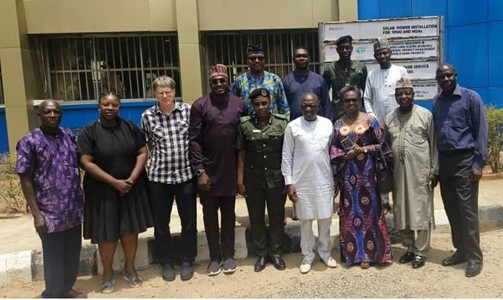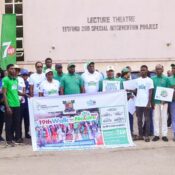
Nigeria KBA National Coordination Group Holds 5th Annual Meeting to Drive Biodiversity Conservation
In a strategic step towards preserving Nigeria’s unique ecosystems and rich biodiversity, the fifth annual meeting of the Nigeria Key Biodiversity Areas (KBA) National Coordination Group (NCG) was convened at the National Park Service Headquarters in Abuja on April 4, 2025. The event brought together seventeen major stakeholders from government agencies, academia, research institutes, and conservation-focused NGOs, all united by a shared mission—to strengthen Nigeria’s conservation framework through the KBA model.
The overall objective of the meeting was to conduct a thorough review of Nigeria’s advancements in biodiversity conservation through the framework of the Key Biodiversity Areas concept, alongside a strategic imperative to drive collaborative endeavours towards implementing effective conservation practices across the nation.
Strengthening Conservation through Collaboration
The annual meeting served as a platform to assess Nigeria’s progress under the KBA framework, promote strategic partnerships, and identify pathways to safeguard biodiversity hotspots across terrestrial and aquatic environments.
Participants included representatives from Nigerian Conservation Foundation (NCF), African Nature Investors (ANI), Wildlife Conservation Society (WCS), Global Environment Facility (GEF), A.P. Leventis Ornithological Research Institute (APLORI), Wildlife Society of Nigeria (WISON), University of Uyo, University of Jos, Federal Ministry of Environment, among others.
Mrs. Caroline Olory, Assistant Conservator of Parks, welcomed attendees on behalf of the Conservator-General (CG) of the National Park Service. The meeting was chaired by Professor Manu Shiiwua, with Dr. Joseph Onoja, Director General of NCF, providing an in-depth overview of the group’s achievements and progress.
Tracking Progress: Key Highlights from the Secretariat
Dr. Onoja shared the historical evolution of the KBA initiative, dating back to its 2016 adoption by thirteen leading global conservation organizations, including BirdLife International, IUCN, and WCS. These organizations expanded the Important Bird Areas (IBA) model into a more inclusive KBA framework, representing broader biodiversity across ecosystems and species.
Nigeria’s Milestones in KBA Implementation:
· First West African nation to establish a National Conservation Group.
· Recognition of all 27 IBAs as Legacy KBAs.
· Three new global KBA sites identified and confirmed—one through NCG coordination.
· Hosting of four annual meetings and workshops on KBA nomination procedures.
· Establishment of the Nigeria Species Specialist Group (NgSSG) to fill critical data gaps.
· Submission of funding proposals to IUCN and mobilization of conservation resources.
Key Stakeholder Insights and Opportunities
The discussions underscored the urgent need for enhanced stakeholder cooperation, sustainable funding, and data-driven decision-making. Key priorities moving forward include:
· Fostering community involvement in KBA management.
· Strengthening legal enforcement and policy alignment.
· Expanding marine and freshwater KBA identification and protection.
· Leveraging technology (e.g., drones, camera traps) for real-time biodiversity monitoring.
· Building an ecological baseline for legacy and potential KBA sites.
Stakeholders also emphasized the importance of updating scientific data submissions to support the effective nomination and management of KBAs.
Addressing Conservation Challenges
Despite notable progress, several systemic challenges persist:
· Limited funding and human resources
· Political interference
· Weak enforcement mechanisms
To overcome these obstacles, the meeting recommended a multi-pronged strategy that includes:
· Diversifying funding beyond NGOs and grants.
· Establishing collaborative platforms between federal, state, and community actors.
· Improving research capacity among local conservationists and park managers.
· Promoting data transparency and inventory reporting to global conservation platforms.
A Shared Vision for Biodiversity Protection
As the meeting drew to a close, participants reaffirmed their commitment to a unified national approach—anchored on science, innovation, and inclusive collaboration. Stakeholders pledged to deepen their efforts through data sharing, joint research, and grassroots engagement, with the goal of securing Nigeria’s biodiversity for generations to come.



